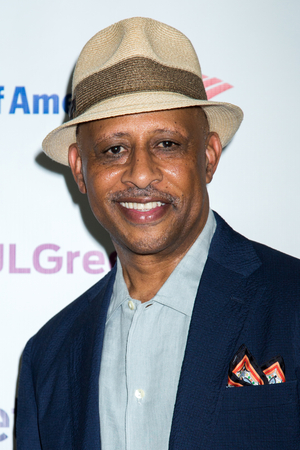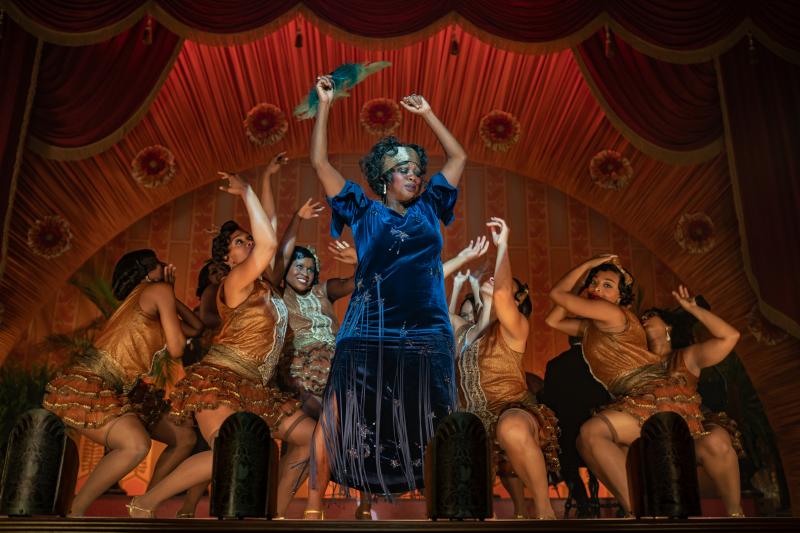Interview: Ruben Santiago-Hudson Talks Adapting MA RAINEY'S BLACK BOTTOM, Chadwick Boseman and More
Ma Rainey's Black Bottom comes to Netflix December 18.

August Wilson's 1982 play Ma Rainey's Black Bottom has arrived on screen, bringing Wilson's incredible work to audiences all over the world - released in theaters on November 25th, Ma Rainey's Black Bottom is set to hit Netflix on December 18th. Co-produced by Tony and Oscar-winning Denzel Washington and directed by Tony Award-winner by George C. Wolfe, Ma Rainey's Black Bottom stars Tony, Oscar, and Emmy Award-winning Viola Davis, and the iconic Chadwick Boseman in his final on screen performance.
The screen adaptation of Ma Rainey's Black Bottom was brought to life by the legendary Ruben Santiago-Hudson, whose connection to August Wilson spans from the personal to professional - not only was he a close friend of the Pulitzer Prize-winning playwright, but Santiago-Hudson has established himself as one of the key interpreters of Wilson's work. His history with August Wilson's plays include receiving a Tony Award in 1996 for his performance in Seven Guitars, winning the Lucille Lortel Award for Outstanding Director for the Off-Broadway production of The Piano Lesson in 2013, receiving a Tony nomination in 2017 for directing the Broadway premiere of Jitney, and more.
We spoke with Ruben Santiago-Hudson about the process of adapting Ma Rainey's Black Bottom for the screen, his thoughts on this being Chadwick Boseman's last on screen performance, and much more.
You have an amazing history and legacy with August Wilson's work, what was your first experience with Ma Rainey's Black Bottom?
1984, I snuck into the Court Theatre at intermission! Slid in there to see this play that everyone had been talking about. I was on the road that year with the Negro Ensemble Company doing Ceremonies in Dark Old Men, and on my little break home I ventured into the Court Theatre, and I went way up to the top not to be discovered. And the lights came on in the second half and I was just overwhelmed and enraptured by the familiarity of the language, the characters, the integrity and the beauty of the dialogue that was so familiar to me growing up in a rooming house in Lackawanna, New York. So I knew these people intimately, and I was like, "Wow, I didn't know this was possible in theatre." And I knew then that I had to be a part of whatever Lloyd Richards and August Wilson were doing.
Where did you begin with adapting this play for this screen?
Since August and I were very, very close, I have a lot of different artifacts and things that he had given me, gifts, books, boxes, ink pens, harmonicas, cards, pieces of fabric from outfits that I'd worn in his plays, and I put everything together and took it all out and tried to conjure August's spirit and feeling and just said, "I'm going to take care of this for you." It's the way I took care of Jitney and got it to Broadway after a decades-long struggle to get a theater and to get somebody to approve and agree to help me get it done. And I kind of had a Libation, which is an African tradition, and August loved African traditions and anything that linked us back to the motherland. So, I pulled everything out and I called on him, and I said, "I want to do this right and I need you with me." And then I started writing!
Were there any moments, or scenes, or lines in particular that you really debated whether to keep in or take out of the screenplay?
Every line that I removed I debated. Not one was easy. So that made a torturous time for me [laughs] because I loved August's work so much and I love August, that it was very difficult to remove a single line, and I had to remove an hour of that play to bring it to 90 minutes. What I had to balance that torture with was, "How do I still protect the integrity and the power and the dynamic of August's brilliance?" Because I have another thing to add to August to help strengthen and empower him, I have the visual, I have the motion picture, I have pictures that move, that create, melodic storytelling, beautiful storytelling. Anything I take out I have to replace it with something visual that can actually duplicate the beauty of his writing.
Why do you feel that this is the right time for a screen adaptation of Ma Rainey's Black Bottom?
It's the right time for August Wilson. It's the right time for black people to be heard. It's the right time for BIPOC people to be heard and try to be understood. It's always a great time for August. August was a revolutionary way before the revolution. It's been a revolution since we were dragged onto this soil, and August was always in front of it, he was always ahead of it, and people did not grasp or understand it. People did not come and make Joe Turner ['s Come and Gone] a two-year run on Broadway, it closed early. Gem of the Ocean closed early. On and on and on. August hasn't had a lot of hit plays on Broadway. You take Ma [Rainey's Black Bottom] and you take Fences, and then you've got to search really hard until you get to Jitney... But August Wilson's work was generally was just not embraced by everyone because people felt they didn't understand it, or it didn't matter to them as much. Eventually, people who wanted fine art, fine writing, fine performances, fine theatre, started coming. And that drumbeat, that conversation that illuminated from people seeing August Wilson's work started people wanting to see August.
But if you look at the history of August Wilson, not a whole lot of his plays made a bunch of money. I think now, with this divisive social context we're living under, particularly under the administration that's on their way out the back door, we needed things that could possibly give us some connectivity as human beings. As opposed to "You're this, I'm that, we don't like you, we don't like black, we don't like Jewish, we don't like Puerto Ricans." No. we need things that say, "Show me what that is. Show me what that life is." And then when you witness it, you realize, "Oh! I'm like that too!" August gives people the experience of African American life. It's not history, it's the experience. And that experience makes you look at me a different way.
What are your thoughts on this being Chadwick Boseman's last onscreen performance?
It's horrific for me to even fathom that that's a possibility because he's a young man who brought so much to the world and had so much to offer, and then he gets his call to go to the great beyond. It's just hard to even imagine. I feel fortunate, and I'm certain that many of us do, that we have his work to continue to reflect on his contributions to society, to the world, to the world of art, to theatre, to film, to humanity. So, we will never be able to forget him even if we tried because he's there in our souls through the body of work that he left. He was born for this. He was born for August's work, he was born for this time, and he made his statement.
August Wilson used to talk about, once your song is truly accepted in the world, then you have arrived. If you read the play Joe Turner ['s Come and Gone], Bynum keeps telling Loomis he has to find his song. And Loomis talks about his father who had died, that he saw him along a road and his father was trying to help teach him his song. And the metaphor of that to me is finding out who you are. And if who you are, genuinely, is accepted by the people that matter to you in the world, then your living is not in vain. Because you are understood to a certain degree, and you have contributed to a certain degree. So, Chadwick found his song, and it was accepted by the world. It's a beautiful thing to think about in a tragic situation.

What were your thoughts when you saw the finished film?
First, you look at it critically. I've only seen the film once, so I didn't really get a chance to just sit back and totally enjoy because I adapted it! So, I'm critical, I'm looking, "Did I take care of August? Did I do August proud?" I was much more concerned about that than, "Did I do Denzel proud? Did I do George [C. Wolfe] proud?" Because once I hand it to them, they're going to do what they want to do with it. That's what happens, that's what writers do. We write and then we hand it to somebody else and we have to get out of the way. We have no more say, nothing else to say unless somebody loves you to the point where they say, "Come! Work with us! Hang with us, we want to pick your brain!" They know that they were fully equipped and capable to deliver an extraordinary film, and they did. They didn't need me anymore.
So, I didn't know what happened on the set, I don't know what it was like. I don't know what a day was like or were they getting along... No one contacted me and said anything to me. And that's not unusual! So I had to wait for the film to come out. And the film came out and I'm nervous, and I want to see if when I accomplished my part of the job and I was satisfied with that, did they honor it? Because what I'm honoring is August. So, "Did you honor me honoring August?" And I was incredibly pleased to see that they did.
What do you hope audiences take away from this film?
I just hope audiences continue to be sensitive to the journey of African American people in this country, BIPOC people in this country. Be more sensitive to it, because we don't spend time dealing with the realities and ramifications of systemic racism or white superiority in this country. And these little opportunities to take a journey with people unlike yourselves, or to walk that road with black people for a minute and see how tumultuous that journey is, how rocky that road is and how we tread that road and still got to the other side and continue to get to the other side. Being sensitive to that journey. I hope when people see this film they realize, "Man, shit ain't fair! So, where do I use my access to level the playing field a little bit?" But, more than anything I hope they're entertained and enlightened.
Check out a trailer for Ma Rainey's Black Bottom below!
Videos


